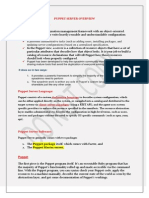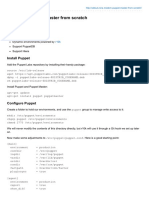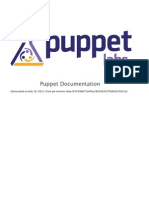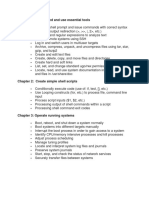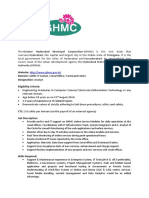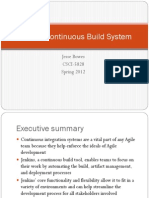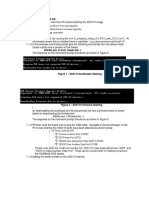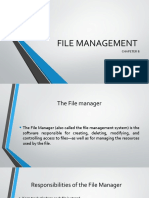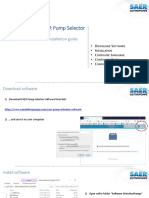Systems Automation
With Puppet
Ohad Levy
Senior Staff Engineer at
Infineon Technologies
Tel Aviv Linux Club
07/09/2008
�Warning
Many of the slides are copied! :)
�Typical System Life cycle
Installation
�Typical System Life cycle
Initial
Configuration
Installation
�Typical System Life cycle
Initial
Configuration
Installation
Fixes
Updates
Audits
�The Challenges
Keep our systems "harmonized"
Know whats going on on each system
Replace a server if it dies or to be able to add another server
that is exactly like it
Similar Applications, different OS's
Push out changes to all the servers that need a particular
change
Stop duplicating effort
Go home early
�How to solve the problem?
TheManualway
Loginanddoit
ThatsOKonlyforalimitedsetofmachines...
Installtimeautoconfigure
Kickstart,jumpstartetc,withapostinstallationscripts
Butthenwhat?
Howtopushachange?
NoHistoryofchanges,auditetc...
Or....
�Puppet Life cycle
Puppet
Initial
Configuration
Installation
Fixes
Updates
Audits
�What is Puppet?
AGPLOpenSourceProjectwritteninRuby
Adeclarativelanguageforexpressingsystem
configuration
AClientandserver
Alibrarytorealizetheconfiguration
Puppetistheabstractionlayerbetweenthesystem
administratorandthesystem
PuppetrequiresonlyRubyandFacter
Clientrunsevery30minutesbydefault
�Puppet components
�Puppet Types
ATypeisaparticularelementthatPuppetknowshow
toconfigure
Files(content,permissions,ownership)
Packages(ensureinstalledorabsent)
Services(enabled/disabled,running/stopped)
Exec(runcommands)
FullList:cron,exec,file,filebucket,group,host,
interface,k5login,mailalias,maillist,mount,
nagios*,package,service,sshkey,tidy,user,
yumrepo,zone
�Example: Managing sudoers file
file{/etc/sudoers:
ensure=>file,
owner=>root,
group=>root,
mode=>600,
source=>puppet://server/files/sudoer
�Dependencies
requireandbefore/aftersettingsensuresthattypesare
appliedinthecorrectorder
file { /etc/sudoers:
...
require => Package[sudo]
}
package { sudo:
ensure => present,
before => File[/etc/sudoers]
}
�Dependencies - continued
notifyandsubscribesettingscantriggercascadedupdates
Particularlyusefulinservices,exec
file { /etc/ssh/sshd_conf:
...
notify => Service[sshd]
}
service { sshd:
subscribe => File[/etc/ssh/sshd_conf
}
�What is Facter?
Factergathersinformationabouttheclient,whichcanbe
usedasvariableswithinpuppet.
Youcanaddcustomfactsasneeded.
package{"sshd":
ensure=>installed,
name=>$operatingsystem?{
solaris=>"IFKLssh",
default=>"opensshserver"
}
}
�Example Facts
$sudofacter
architecture=>amd64
domain=>sin.infineon.com
facterversion=>1.3.8
lsbdistid => Ubuntu
lsbdistrelease => 8.04
macaddress => 00:1c:25:14:26:ab
fqdn=>sinn1636.sin.infineon.com
manufacturer => LENOVO
hardwaremodel=>x86_64
memorysize => 1.94 GB
hostname=>sinn1636
processorcount => 2
ipaddress=>172.20.88.132
kernel=>Linux
puppetversion => 0.24.4
kernelrelease=>2.6.2416generic
rubysitedir =>
/usr/local/lib/site_ruby/1.8
lsbdistcodename=>hardy
rubyversion => 1.8.6
lsbdistdescription=>Ubuntu8.04
�What is a Class?
Anamedcollectionoftypeobjects
Canincludeorinheritfromotherclasses
class sudo_class {
include foo_class
file { /etc/sudoers:
...
}
package{ sudo:
...
}
}
�Class inheritance
class afile {
file { /tmp/foo:
ensure => file
source => /src/versionA
}
}
class another_file inherits afile {
File[/tmp/foo] {
source => /src/versionB
}
}
�What is a Node ?
Aconfigurationblockmatchingaclient
Cancontaintypes,classes
defaultnodematchesanyclientwithoutanode
block
node ohad.myself {
include sudo_class
include other_class
}
�External Node
Nodedefinitionscanbedefinedoutsideofpuppet
LDAP,externalscript
Idealforsiteswithtoomanynodestobotherpre
creating
�Classes and definitions
Classesaregroupsofresources.
Definitionsaresimilartoclasses,buttheycanbeinstantiatedmultipletimeswithdifferentargumentson
thesamenode.
class apache2 {
define simple-vhost ( $admin = "webmaster", $aliases, $docroot) {
file { "/etc/apache2/sites-available/$name":
mode
=> "644",
require => [ Package["apache2"], Service["apache2"] ],
content => template("apache/vhost.conf"),
} } }
node debiantest {
include apache2
apache2::simple-vhost { "debian.example.com":
"/var/www/debian"}
docroot =>
apache2::simple-vhost
{ "test.example.com":
docroot =>
"/var/www/test"}
�vhost.conf template
PuppetusesRuby'sERBtemplatesystem:
<VirtualHost *>
ServerAdmin
<%= admin %>
DocumentRoot
<%= docroot %>
ServerName
<%= name %>
<% aliases.each do |al| -%>
ServerAlias
<%= al %>
<% end -%>
ErrorLog "|/usr/bin/cronolog /var/log/apache/<%=
name %>/%Y-%m/error-%d"
CustomLog "|/usr/bin/cronolog /var/log/apache/<%=
name %>/%Y-%m/access %d" sane
</VirtualHost>
�Templates output
# more /etc/apache2/sites-available/debian.example.com
<VirtualHost *>
ServerAdmin
system@example.com
DocumentRoot
/var/www/debian
ServerName
debian.example.com
ServerAlias
debiantest.example.com
ServerAlias
debian
ErrorLog "|/usr/bin/cronolog
/var/log/apache/debian.example.com/%Y-%m/error-%d"
CustomLog "|/usr/bin/cronolog
/var/log/apache/debian.example.com/%Y-%m/access-%d" sane
</VirtualHost>
�OS API - It also works the
other way around:
$ralshuserlevyo
user{'levyo':
password=>'absent',
shell=>'/bin/bash',
ensure=>'present',
uid=>'49960',
gid=>'49960',
home=>'/home/levyo',
comment=>'OhadLevy',
groups=>
['adm','dialout','fax','cdrom','floppy','tape','audio','dip','plugdev','scanner','fuse','lp
admin','admin']
�Getting Started
Installpuppet(yum/aptgetinstallpuppet)orinstall
ruby,geminstallfacter/puppet.
Setupthepuppetserver(puppetmaster)use
versioncontrol!
Writeamanifestforyournode.
Startpuppetmasterontheserver
Runpuppetdontheclient
�Next steps - modules
Modulesallowyoutogroupboththelogicandthefilesforanapplicationtogether.
Puppetautomaticallysearchesitsmodulepathtofindmodules.
Modulescancontainfourtypesoffiles,eachofwhichmustbestoredinaseparate
subdirectory:
Manifestsmustbestoredinmanifests/,andifyoucreatemanifests/init.ppthen
thatfilewillbeloadedifyouimportthemodulenamedirectly,e.g.import
"mymodule".
Templatesmustbestoredintemplates/,andthemodulenamemustbeaddedto
thetemplatename:template("mymodule/mytemplate.erb")
Filesstoredinfiles/,theseareavailablefromthefileserverunder
modules/<modulename>/files/<filename>.
Pluginsadditionaltypes,providersorfacts.
�File server and File Bucket
Puppetalsoincludesafileserverwhichyoucanusefortransferringfilesfromthe
servertotheclient.
Ifyouconfigureit,puppetcanalsosaveabackupofeachfilethatischangedonthe
clienttotheserver.Thebackupsgoinafilebucketandcanberetrievedlater.
�Some more info
PuppetusesSSLforallcommunications,thereforit
includesaCA,youcanautomaticallysignCSRor
usepuppetcatooltomangethem.
Storeconfig,optiontosavemachinestates(facts,
configurationruns)andspecialfacts(e.g.SSHkeys)
inadatabase.
Reporting,puppethasafewreportingoptions,most
commonareemailswithchanges,RRDfiles,yaml
filesandpuppetshowwebinterface.
PuppetHA,loadbalancingetc.
�Conclusions
We'reallstuckonthehamsterwheel
Makeseasystuffeasy,hardstuffpossible
Similarprojects
cfengine
bcfg2
AdditionalResources
http://reductivelabs.com/trac/puppet
http://reductivelabs.com/trac/puppet/wiki/LanguageTutorial
http://reductivelabs.com/trac/puppet/wiki/CompleteConfiguration
#puppetonirc.freenode.org


